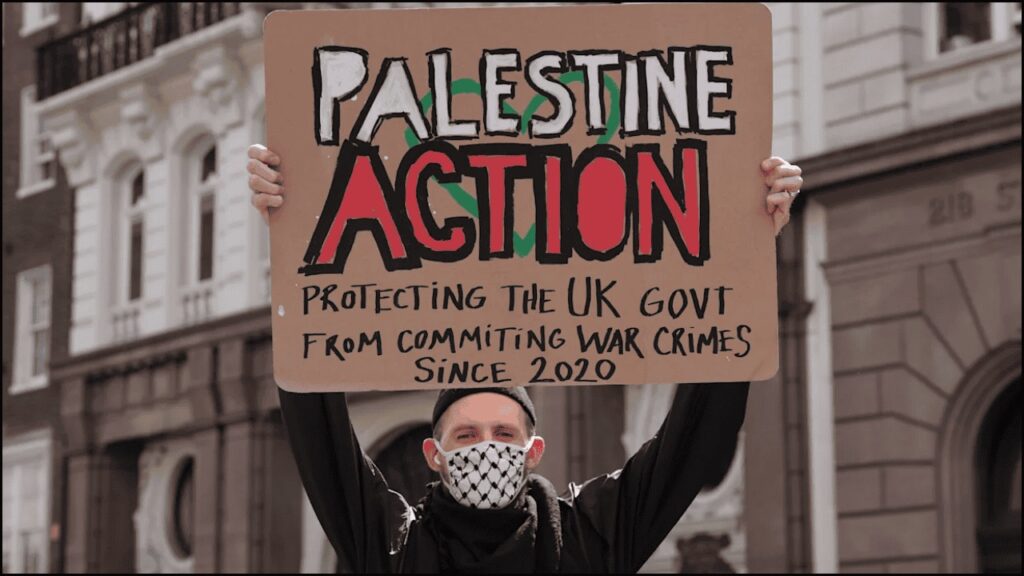
The government has been given permission to challenge a High Court ruling that allowed campaign group Palestine Action to appeal against its proscription under UK terrorism laws. The decision opens the way for a significant legal battle over free speech, national security, and the limits of political activism.
Table of Contents
Court of Appeal Intervention
In July, Palestine Action’s co-founder, Huda Ammori, won the right to appeal against the ban after her lawyers argued that proscription breached fundamental rights to freedom of speech and political expression. At the time, the Home Office was denied permission to challenge that ruling.
However, a Court of Appeal judge has now overturned that block, ruling that the government’s appeal “has a real prospect of success”. Lord Justice Underhill also stressed that it was “highly desirable” for the matter to be considered urgently, with a hearing set for 25 September.
The group’s main legal challenge, brought by Ms Ammori, is scheduled for a three-day hearing in November.
The Ban and Its Consequences
The Home Office moved to proscribe Palestine Action in July, citing national security concerns after activists broke into an RAF base and caused damage to two military aircraft. The group has become known for direct action against firms linked to supplying equipment to Israel, including property damage and blockades.
The ban came into effect on 5 July. Since then, more than 700 people have been arrested by the Metropolitan Police under terrorism legislation, accused of showing support for or being involved with the organisation.
Proscription makes it a criminal offence to belong to, promote, or even express support for the group. Convictions can carry severe penalties, including imprisonment.
Free Speech at the Centre of the Case
Palestine Action argues that the ban represents a disproportionate attack on free expression and peaceful protest. In July, Mr Justice Chamberlain accepted that there was an arguable case to be made, noting that the decision to proscribe could potentially conflict with rights guaranteed under the European Convention on Human Rights.
He also said the Home Office could have consulted the group before imposing such a sweeping ban. That ruling paved the way for Ms Ammori’s appeal, which the government is now determined to challenge.
Political and Legal Reactions
Following the Court of Appeal’s latest decision, Ms Ammori accused Home Secretary Yvette Cooper of attempting to “avoid scrutiny” of her decision.
“The political misstep by Yvette Cooper has led to hundreds facing prosecution under the Terrorism Act, leading to a much wider chilling effect on freedom of speech,” she said.
She claimed that by “doubling down” and pursuing an appeal, the government was further undermining public trust in democratic rights.
Cooper has defended the decision to proscribe the group, arguing last month that many supporters “don’t know the full nature” of its activities. She described Palestine Action as “not a non-violent organisation”, stressing that its track record of criminal damage justified the ban.
Wider Implications
The case is being closely watched by campaign groups, human rights lawyers, and political figures. Critics argue that expanding the use of counter-terror legislation risks criminalising protest movements and eroding freedoms.
Supporters of the government’s approach, however, say the line must be drawn where activism crosses into criminality, especially when it involves attacks on military infrastructure.
The upcoming September appeal hearing will determine whether the government can proceed with its challenge to Ms Ammori’s case. If it succeeds, it could reshape the legal grounds on which Palestine Action’s challenge is fought in November.
Looking Ahead
For now, the legal dispute highlights the tension between protecting national security and safeguarding civil liberties. With the Court of Appeal recognising the case’s urgency, both sides are preparing for a decisive confrontation in the coming weeks.
The outcome will not only determine the future of Palestine Action’s ban but may also set a precedent for how far the government can go in using terrorism laws against protest movements.





